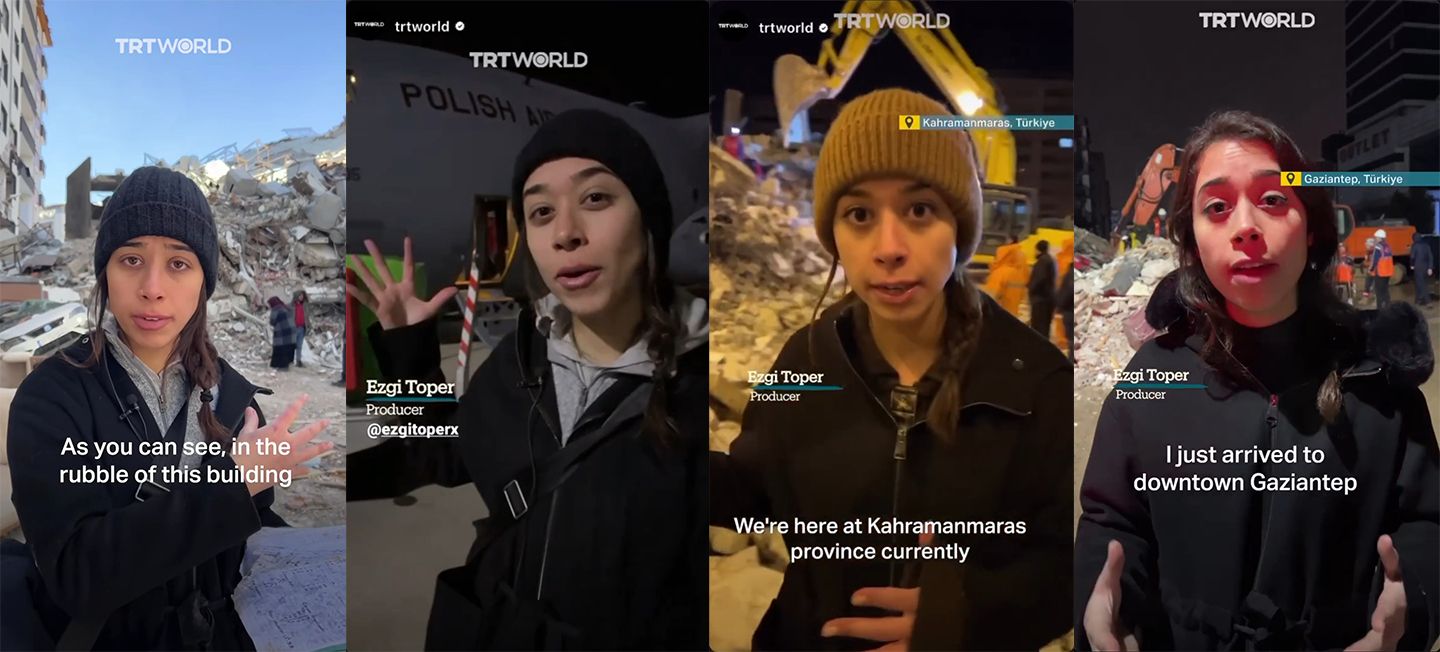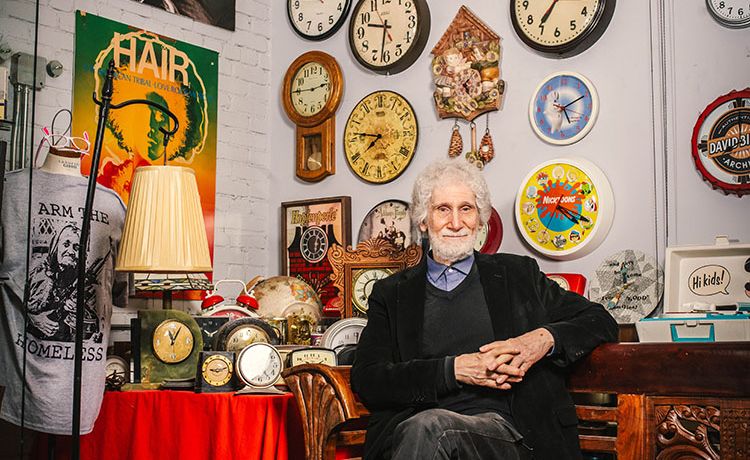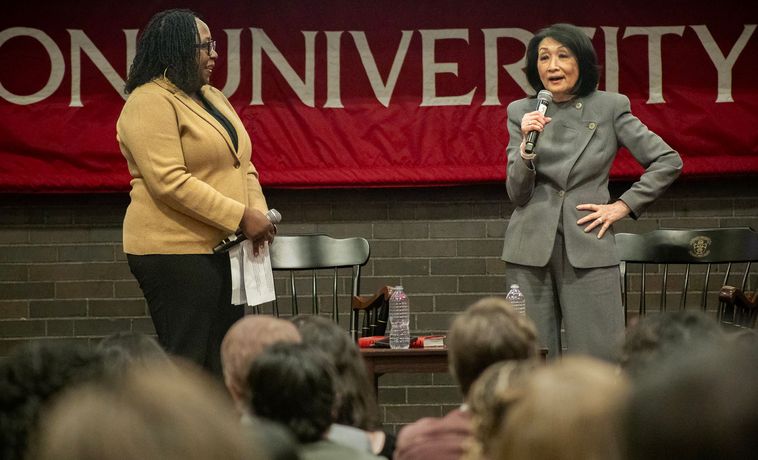After the earthquake, reporting that hit home
Covering the tragic natural disaster was Turkish multimedia journalist Ezgi Toper (COM'19).

Screenshot composite of Ezgi Toper—normally a producer behind the scenes for TRT World—reporting on camera following the earthquakes. Courtesy of Ezgi Toper.
The deadliest earthquake in decades hit the southern border area of Türkiye (Turkey) to northern Syria in early February, a 7.8-magnitude earthquake centered in Gaziantep, Türkiye, leaving a death toll of more than 47,000 between the two countries. In the field reporting on the tragic natural disaster was Turkish multimedia journalist Ezgi Toper (COM’19).
While of Turkish descent, Toper was born and raised in Johannesburg, South Africa, for 11 years. She then lived in Perth, Australia, and Ankara, Türkiye, where she attended high school before moving to Boston. She graduated from Boston University with a journalism degree and a minor in psychology, writing for the Daily Free Press and Framingham’s MetroWest Daily News through COM’s Statehouse Program and hosting the WTBU radio show Jalapeno Peppers.
While at BU, she interned at GBH’s WORLD Channel before being hired as a Digital Production Assistant. After a year, she returned to Türkiye, accepting a position as a digital news producer for TRT World, a Turkish public broadcaster. Most recently, her job has taken her to the site of the earthquakes, talking to first responders and residents as they search through the rubble for survivors and try to find shelter after another aftershock.
Q&A
With Ezgi Toper
COM: How soon after the last quake were you able to reach those regions?
Ezqi Toper: I was on shift the morning the first earthquake hit and by early afternoon my boss had approached me and asked if I would like to be sent to the field to report. I immediately agreed and so our small team from TRT World Digital, which included two producers and two cameramen, set off to Istanbul Airport to catch a flight. We joined a rescue team on a flight organized by Türkiye’s Disaster and Emergency Management Agency (AFAD) to the southern Gaziantep province. While we were at the airport, we were informed that a second earthquake had hit and by the evening we were in the area reporting from the scene.
COM: Are you normally on camera, or more behind the scenes in a news story? If the latter, how have you adjusted to being on camera for your news organization?
Ezqi Toper: Before this experience, I’d never been in front of the camera or done any field reporting for TRT World. Typically, I’m behind the scenes of a news story, whether it’s writing articles, managing content on our website, or recording voice-overs for our digital series, social media videos and news podcast. Without a script or teleprompter, I had to adjust to mostly improvising my lines and becoming comfortable in an unpredictable environment. With rescue efforts ongoing and aftershocks still shaking the region, I knew any second the story could develop or shift focus, so I had to be on my toes and ready to change gears as necessary. This was a stark contrast to what I was used to in the newsroom while working on my longer feature stories. While it was definitely a challenging and highly emotional first experience, I’m very proud of the work I was able to do with limited resources.
COM: Has anything prepared you for covering a major tragedy?
Ezqi Toper: Nothing had prepared me for this experience and even with training, I believe nothing could fully prepare anyone to cover a tragedy of this scale: it was the biggest disaster in modern Türkiye and many reporters across the globe said they’d never seen anything like it before. However, several of my colleagues with more experience reporting from disaster zones gave me ample guidance right before I left and during the deployment. I can now say I’m much more prepared for another tragedy but I pray I never have to put that preparation into action.
COM: What is the most difficult part of reporting a story like this?
Ezqi Toper: A story like this quite literally hits home for me. So, I’d say the most difficult part was the emotional toll it took (and continues to take) on Turkish reporters like myself who are in mourning alongside the rest of the country but also trying to do our job as best as we can. It’s very different seeing footage of the collapsed building, photos of locals in despair or reading stories about exhausted rescue workers in comparison to actually seeing those scenes and more right in front of you. The gravity of the pain on the ground is something screens cannot quite capture.
Other challenges included not being able to find food or water for days, having to sleep on the floor of the crisis center, having limited access to cellular services to update friends and family on my condition and the lack of a sense of safety amid aftershocks.
COM: How have you been staying safe (physically and mentally) while covering something like this so close to home?
Ezqi Toper: Although I live in Istanbul, which is far from the southern earthquake region, every corner of Türkiye is home to me. While covering the story, our team was cautious to not step inside any damaged buildings or enter the rubble, but aftershocks were still continuing and safety was never guaranteed. We opted to sleep on the floor of the crisis center instead of staying in any accommodation as some buildings that were still standing had also suffered damage and had the risk of collapsing. As for mentally, I’m blessed to have a very strong support system of friends and family who have helped me and continue to help me get through some of the impacts this reporting took on my mental health.
COM: What’s next for you — more on the quake’s aftermath or something else?
Ezqi Toper: Since my deployment, I’ve been focusing solely on earthquake-related stories in our newsroom. I am currently preparing for a second trip to the area. This time round, I’d like to report on clean-up and rebuilding efforts as rescue operations are ending in most of the provinces. Although the experience was heartbreaking, it also felt extremely fulfilling to contribute to the spread of information about the disaster to hopefully help collection of aid/donation and give a voice to the locals whose lives have been forever changed.
The Boston University Turkish Student Association is accepting donations from the BU community to support the Bridge to Türkiye Fund in support of ongoing search and relief efforts. Donate via GoFundMe.


